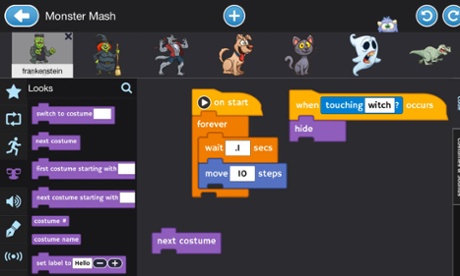
Education technology startup Tynker is expanding to Android, after attracting more than 8.8 million children to computer programming courses through its website and iPad app.
The company has launched its Android tablet app on the Google Play app store, including a new mode – also available in the iPad version – for children to create their own games.
Tynker is one of several firms whose apps' visual programming interfaces are aiming to help children take their first coding steps, with rivals including fellow US company Hopscotch, and British startup Kuato Studios, with its Hakitzu Elite app.
Until today, Tynker's iPad app focused on a series of exercises where children learn programming concepts including functions, subroutines and conditional logic by solving puzzles.
It is available in a free version where parents buy the different puzzle packs as in-app purchases, as well as a premium version aimed at schools, where the packs are included in a single upfront price. For now, Android is getting the premium version.
The new game creation mode – Tynker Workshop – is the biggest change to Tynker's app. It uses the same visual programming language as the exercises, but encourages children to create their own projects.
They can create from scratch using characters and backgrounds provided by the app, or use nine pre-built game "kits" based on popular genres: Brick Breaker, Arcade Shooter, Scavenger Hunt and Physics Game for example.
"The first app has been extremely well received, and we've had lots of requests for the update, particularly kids being able to build their own things," Tynker's chief executive Krishna Vedati told the Guardian.
"The templates that we are providing – and there will be more of those – can kickstart the kids, and they can go from there, making their own things once they get used to it."
Tynker is planning to let children use the same login details for its apps and website, so they can work on their projects across multiple devices, for example on a computer at school – the company says its service is being used by more than 10,000 of them – and a tablet at home.
• Seven kids coding projects that crowdfunded their first steps
• Aardman gets kids coding with Shaun the Sheep contest
• Kids coding book Hello Ruby: 'It's not a girl/boy thing'
The new mode makes Tynker more of a direct competitor to Scratch, the visual programming language developed within the MIT Media Lab, which is a popular choice for schools running programming lessons for children.
A big part of Scratch's appeal is the ability for children to share their projects online for others to download and alter. Vedati said Tynker is taking a cautious approach to community features, preferring to give teachers moderation tools to control how projects are shared.
"We are looking at ways to do programming with peers: can I share a program with my friend, iPad to iPad for example, so we can work and play together?" he said. "We are also thinking about communities within the family, where kids might want to send projects to their brothers and sisters, parents or grandparents."
Vedati added that Tynker is thinking about how it can work with hardware, so children can use its programming language to control devices too: "Why can't a kid create their own alarm clock and weather app? We want to go down that path..."
Tynker is also hoping to pick up more schools as partners in the UK, with 400 already using its courses and app. This year will see programming introduced into the British educational curriculum at a much earlier age – a development greeted with excitement but also concerns about the challenge of training up enough teachers by the end of the summer.
Technology companies have been trying to help: witness Google's £120k of funding for training run by coding clubs network Code Club, and Microsoft's investment of £334k in 'Back to School' sessions run by UK body Computing at Schools.
Startups like Tynker are hoping to be involved too: Vedati says that Tynker has been working on its lesson plans and other resources for British teachers, drawing on its work in the US including a number of programming-focused summer camps this year.
One criticism of kids' coding apps is that while they can introduce programming concepts in a fun and accessible way, it's not always clear how effective a stepping stone they are to the specific languages that older children with an aptitude for this kind of thinking may be learning.
"Can they go from making games in Tynker to making native apps for Android and iPhones?" said Vedati. "That's one of the things we're looking at, from the point of view of can we handshake them off to a mainstream programming language?"
• 'Why all of our kids should be taught how to code'

